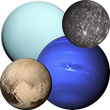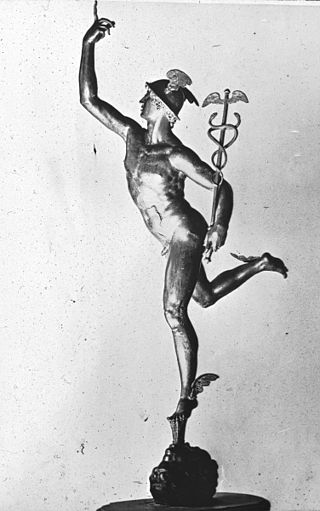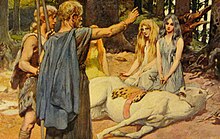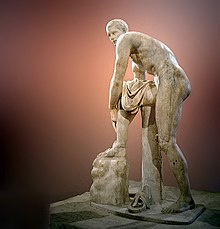


Rough Notes:
Mercury (mythology)
Mercury (mythology)(/ˈmɜrkjʉri/; Latin: Mercurius listen (help•info)) is a major Roman god, being one of the Dii Consentes within the ancient Roman pantheon. He is the patron god of financial gain, commerce, eloquence (and thus poetry), messages/communication (including divination), travelers, boundaries, luck, trickery and thieves; he is also the guide of souls to the underworld.
Quotes[edit]
- Hermes in Greek mythology, a deity; herald and messenger of the gods; gods of roads, commerce, invention, cunning, and theft; patron of … and Mercury of Roman mythology, often identified with Hermes, who served also as messenger to the other gods and was god of commerce, travel and thievery.
- United States National Highway Traffic Safety Administration in: "Star of Life", Emergency Medical Care Symbol: Background, Specifications, and Criteria, U.S. Department of Transportation, National Highway Traffic Safety Administration, Office of Enforcement and Emergency Services, 1995
- Mercury is related with the mental faculties of the individual. Its primary role is to comprehend the intonationsfrom Buddhic consciousness. It also operates to derive lessons from various mundane experiences. Mercury sharpens the intellect and energises the mind principle.
- Bepin Behari in:The Timing of Events, Motilal Banarsidass Publ., 1 January 2002, P.41
- Mercury is related to self-knowledge and Jupiter with philosophy, righteousness, and religious aspirationswhich are very different aspects of the Sun. Venus is the embodiment of happiness, an aspect of the Supreme. Saturn stands for the cause of destruction but then ultimate dissolution is also an aspect of the solar deity for its withdrawal of vital energy form the individual leads to dissolution or death.
- Bepin Behari in: “The Timing of Events”, Page xxiii

...is worship was introduced early, and his temple on the Aventine Hill in Rome was dedicated in 495 BC. There he was associated with the goddessMaia, who became identified as his mother through her association with the Greek Maia, mother of Hermes... -The Editors of Encyclopædia Britannica.

...I am the spirit of metals, the firewhich does not burn, the water which does not wet the hands. If you find the way to slay me you will find the philosophical mercury of the wise, even the White Stone beloved of the Philosophers. If you find the way to raise me up again, you will find the philosophical sulphur, that is, the Red Stone and Elixir of Life. Obey me and I will be your servant; free me and I will be your friend. Enslave me and I am a dangerous enemy; command me and I will make you mad; give me life and you will die. - Patrick Harpur.

Mercury in his role as messenger - The Romans believed that gods and goddesses were in charge of everything on Earth. Mercury is named after the messenger for their gods. The Roman Mercury had wings on his helmet and shoes. He could travel very quickly from place to place. The planet Mercury moves quickly around the sun. That is how it got its name.

But it is a very remarkable circumstance, that an acquaintance with the seven days of the week, so familiar from remote antiquity to the people who originally spoke Sanskrit language, though unknown to the Greeks and Romans, should have been preserved among the Germans... - Vans Kennedy.
- Mercury, Latin Mercurius, in Roman religion, god of merchandise and merchants, commonly identified with the Greek Hermes, fleet-footed messenger of the gods. His worship was introduced early, and his temple on the Aventine Hill in Rome was dedicated in 495 BC. There he was associated with the goddess Maia, who became identified as his mother through her association with the Greek Maia, mother of Hermes. Both Mercury and Maia were honoured in a festival on May 15, the dedication day of Mercury’s temple on the Aventine. Mercury is sometimes represented as holding a purse, symbolic of his business functions.
- The Editors of Encyclopædia Britannica in: MercuryAlternate title: Mercurius , Encyclopædia Britannica, 2 March 2014
- In Vishnu Purana, in the final dissolution Vishnu assumes the form of Rudra, the destructive persona of Shiva, and proceed to set the world ablaze. The seven main rays of the Sun which are mentioned in this myth are, according to Hindu Astronomy in this myth the most important among its thousands. These seven are all identified by name and supply heat and light to the moon, stars and the planets Mercury, Venus, Mars, Jupiterand Saturn. The blaze is followed by a flood and then a period of quiescence and regeneration.
- A. L. Dallapiccola in: Hindu Myths, University of Texas Press, 2003, p. 52
- My Seal-Ring
Mercury has cast aside
The signs of intellectual pride,
Freely offers thee the soul:
Art thou noble to receive?
Canst thou give or take the whole,
Nobly promise and believe?
Then thou wholly human art,
A spotless, radiant, ruby heart,
And the golden chain of love
Has bound thee to the realm above- Margaret Fuller in: Julia Ward Howe Margaret Fuller, marchesa Ossoli, 1883, p. 228
- Know this: I, Mercurius, have here set down a full, true and infallible account of the Great Work. But I give you fair warning that unless you seek the true philosophical gold and not the gold of the vulgar, unless you heart is fixed with unbending intent on the true Stone of the Philosophers, unless you are steadfast in your quest, abiding by God’s laws in all faith and humility and eschewing all vanity, conceit, falsehood, intemperance, pride, lust and faint-heartedness, read no farther lest I prove fatal to you. For I am the watery venomousserpent who lies buried at the earth’s centre; I am the fiery dragon who flies through the air. I am the one thing necessary for the whole Opus. I am the spirit of metals, the fire which does not burn, the water which does not wet the hands. If you find the way to slay me you will find the philosophical mercury of the wise, even the White Stone beloved of the Philosophers. If you find the way to raise me up again, you will find the philosophical sulphur, that is, the Red Stone and Elixir of Life. Obey me and I will be your servant; free me and I will be your friend. Enslave me and I am a dangerous enemy; command me and I will make you mad; give me life and you will die.
- Patrick Harpur in: Mercurius, Or, the Marriage of Heaven & Earth, Blue Angel Gallery, 2007, p,17
- Rudbeck thinks that the different attributes of Mercury, as the father of letters, the god of money, the inventor of geometry, of astronomy, of numbers, of weights and measures, and of merchandise, may all be traced to Goth. merkia which signifies to cut on wood, to enumerate, to strike metals, to affix limits, and to distinguish the heavenly signs.
- Jamieson in: Francis Edward Jackson Valpy An Etymological Dictionary of the Latin Language , Baldwin and Company, 1828, p. 259
- But it is a very remarkable circumstance, that an acquaintance with the seven days of the week, so familiar from remote antiquity to the people who originally spoke Sanskrit language, though unknown to the Greeks and Romans, should have been preserved among the Germans. It is true, indeed, that among them the days received their names from their principal deities, and not merely from the planets, which, in Hindu mythology, are considered only as celestial beings of an inferior description. There seems, also, to be no doubt that Germans selected the names of the same planets to designate the days of the week, which have been immemorially used for the same purpose by the Hindus; and that, in both Germany and India, their consecutive order was the day of the Sun, the Moon, Mars, Mercury, Jupiter, Venus and Saturn.
- Vans Kennedy in: Researches Into the Nature and Affinity of Ancient and Hindu Mythology by Vans Kennedy, Longman, Rees, Orme, Brown and Green, 1831, p. 396-97
- And while he was Euphorbus, he used to say that he [Pythagoras] had formerly been Aethalides, and that he had received as a gift from Mercury the perpetual transmigration of his soul, so that it was constantly transmigrating and passing into whatever plants or animals it pleased.
- Diogenes Laërtius in: D. Nickerson The origin of thought, K. Paul, Trench, Trübner, 1901, p. 333
- And when we say also that the Word, who is the first-birth of God, was produced without sexual union, and that He, Jesus Christ, our Teacher, was crucified and died, and rose again, and ascended into heaven, we propound nothing different from what you believeregarding those whom you esteem sons of Jupiter. For you know how many sons your esteemed writers ascribed to Jupiter: Mercury, the interpreting word and teacher of all; Aesculapius, who, though he was a great physician, was struck by a thunderbolt, and so ascended to heaven; and Bacchus too, after he had been torn limb from limb; and Hercules, when he had committed himself to the flames to escape his toils; and the sons of Leda, and Dioscuri; and Perseus, son of Danae; and Bellerophon, who, though sprung from mortals, rose to heaven on the horse Pegasus. For what shall I say of Ariadne, and those who, like her, have been declared to be set among the stars? And what of the emperors who die among yourselves, whom you deem worthy of deification, and in whose behalf you produce some one who swears he has seen the burning Caesar rise to heaven from the funeral pyre? And what kind of deeds are recorded of each of these reputed sons of Jupiter, it is needless to tell to those who already know. This only shall be said, that they are written for the advantage and encouragement of youthful scholars; for all reckon it an honourable thing to imitate the gods. But far be such a thought concerning the gods from every well-conditioned soul, as to believe that Jupiter himself, the governor and creator of all things, was both a parricide and the son of a parricide, and that being overcome by the love of base and shameful pleasures, he came in to Ganymede and those many women whom he had violated and that his sons did like actions. But, as we said above, wicked devils perpetrated these things. And we have learned that those only are deified who have lived near to God in holiness and virtue; and we believe that those who live wickedly and do not repent are punished in everlasting fire.
- Justin Martyr in: the Apostolic fathers uoted in: Chapter XXI.—Analogies to the history of Christ.,ccel.org
- Mercury was the son of Jupiter (king of the gods), the result of an illicit union with Maia, goddess of the clouds (as well as one of the Pleiades). His many adventures and his assignment as guide of the dead to Hades, made him the patron god of travellers. But his tricks also made him patron of thieves. The Romans also made him god of merchants and he lent his name to "mercantilism". Wednesday was his day of the week. This day the Romans called "Mercurii dies", which survives in the names for that day in many of the Romance languages, such as the Spanish, "miércoles". We also find Mercury lending his fame, in a "mercurial" manner, to a number of other objects...
- Messenger In: Mercury - the Messenger God, InDepthInfo
- The Romans believed that gods and goddesses were in charge of everything on Earth. Mercury is named after the messenger for their gods. The Roman Mercury had wings on his helmet and shoes. He could travel very quickly from place to place. The planet Mercury moves quickly around the sun. That is how it got its name.
- NASA in: What Is the Planet Mercury? , NASA, 30 March 2011
- Paret Atlantiades dictis genitoris et inde
summa pedum propere plantaribus inligat alis
obnubitque comas et temperat astra galero.
tum dextrae uirgam inseruit, qua pellere dulces
aut suadere iterum somnos, qua nigra subire
Tartara et exangues animare adsueuerat umbras.
desiluit, tenuique exceptus inhorruit aura.
nec mora, sublimes raptim per inane volatus
carpit et ingenti designat nubila gyro.- Atlas' grandson obeys his sire's words and hastily thereupon binds the winged sandals on to his ankles and with his wide hat covers his locks and tempers the stars. Then he thrusts the wand in his right hand; with this he was wont to banish sweet slumber or recall it, with this to enter black Tartarus and give life to bloodless phantoms. Down he leapt and shivered as the thin air received him. No pause; he takes swift and lofty flight through the void and traces a vast arc across the clouds.
- Statius, Thebaid, Book I, line 303 (tr. D. R. Shackleton Bailey)

....Mercury was connected with the deity Woodan, or Odin among the northern seafarers. In Italy ancient people called Mercury Boudha, a word with the same origin as Woodan or Odin. The connection lives on in our current use of English day of week Wednesday derived from Woodan’s day. - Robert G. Strom
- There is ample linguistic evidence that some of the first people to observe Mercury and commit the planet to the immortality of myth were Germanic people and Scandinavians who navigated far south from their native lands into what is now the Mediterranean and the coasts of Africa. Mercury was connected with the deityWoodan, or Odin among the northern seafarers. In Italy ancient people called Mercury Boudha, a word with the same origin as Woodan or Odin. The connection lives on in our current use of English day of week Wednesday derived from Woodan’s day.
- Robert G. Strom, Ann L. Sprague in: Exploring Mercury: The Iron Planet, Springer Science & Business Media, Jul 15, 2003, p. 2
- The astronomical symbol of Mercury [☿] can be traced to a medieval Greek manuscript where it takes the form ?. The horizontal cross is a modern addition. The "horns" at the top of the symbol represent the wings of this speedy planet It is from the use of the name Hermes for Mercury that the usage of Hermean for characteristics of Mercury became popular during the 19th century and continues to be used by some today.
- Robert G. Strom, Ann L. Sprague in: "Exploring Mercury: The Iron Planet", p. 3
- Hermes is the god of the unexpected, of luck, of coincidence, of 'synchronicity.' The ancient Greeks would say: 'Hermes has entered our midst,' whenever a sudden silence had entered the room, descended on conversation and introduced into the meeting another dimension. Whenever things seem fixed, rigid, 'stuck,' Hermes introduces fluidity, motion, new beginnings - as well as the confusion which inevitably precedes new beginnings.
- Gisela Labouvie-Vief in: Psyche and Eros: Mind and Gender in the Life Course, Cambridge University Press, 26 August 1994, p. 257

As Hermes Psychopompos, he also serves as a guide of souls into the underworld. Under his Roman name of Mercury, Hermes is the prime god of the alchemists who hoped to transform base matter into refined, spiritual gold. Mercury is “quick silver”, the spirit that existed in matter. - Gisela Labouvie-Vief
- As Hermes Psychopompos, he also serves as a guide of souls into the underworld. Under his Roman name of Mercury, Hermes is the prime god of the alchemists who hoped to transform base matter into refined, spiritual gold. Mercury is “quick silver”, the spirit that existed in matter.
- Gisela Labouvie-Vief In: "Psyche and Eros: Mind and Gender in the Life Course", P.258
- Roman version of the Greek god Hermes, Mercury played a particular role among the medieval alchemists who hoped to transform mercury to gold.
- Gisela Labouvie-Vief in: :Psyche and Eros: Mind and Gender in the Life Course", P.276
- Mercurial is relating to, or born under the planet Mercury. It is having qualities of eloquence, ingenuity, or thievishness attributed to the god Mercury or to the influence of the planet Mercury. It is characterized by rapid and unpredictable changeableness of mood [a mercurial temper] of, relating to, containing, or caused by Mercury.
- Merriam-Webster in: mercurial, merriam-webster.com
See also[edit]
- Mercury (element), the chemical element
- Mercury (planet), the closest planet to the Sun
